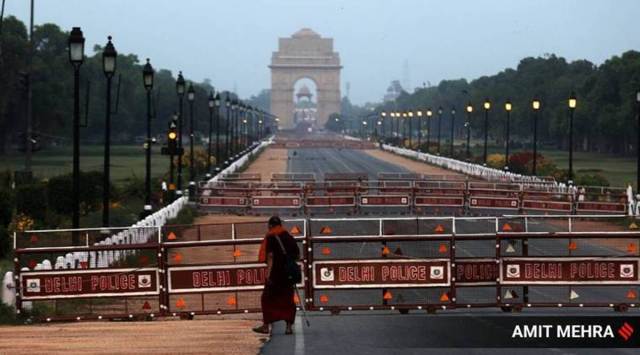THE SUPREME COURT Sunday called upon the Centre to revisit its vaccine procurement policy stating it would “prima facie result in a detriment to the right to public health which is an integral element of Article 21 of the Constitution”. It also urged the Centre and states “to consider imposing a lockdown to curb the virus in the second wave in the interest of public welfare”.
On lockdown, the Supreme Court bench of Justices DY Chandrachud, L Nageswara Rao and S Ravindra Bhat said, “We are cognisant of the socio-economic impact of a lockdown, specifically, on the marginalised communities… thus, in case the measure of a lockdown is imposed, arrangements must be made beforehand to cater to the needs of these communities.”

Further, observing that no one shall be denied hospitalisation or essential drugs for lack of local residential proof or identity proof, the bench asked the Centre to formulate a national policy on admissions to hospitals within two weeks, which should be followed by all states.
Story continues below this ad
The Centre had, on April 20, revised its vaccine policy and said it would purchase only 50 per cent of the output, and allow vaccine manufacturers to sell the balance 50 per cent directly to states and private entities at higher prices.
The bench of the three Justices suggested that the procurement of vaccines be centralised, and distribution within states and Union Territories be decentralised. “Prima facie, the rational method of proceeding in a manner consistent with the right to life (which includes the right to health) under Article 21 would be for the Central Government to procure all vaccines and to negotiate the price with vaccine manufacturers. Once quantities are allocated by it to each State Government, the latter would lift the allocated quantities and carry out the distribution,” the bench said.
Referring to the revised vaccine policy, it said, compelling states to negotiate with manufacturers on the ground of promoting competition and making it attractive for new vaccine manufactures will likely be detrimental to those in the 18-44 age group. This group, it said, also included ‘Bahujans’ or those belonging to other under privileged and marginalised groups who may not have the ability to pay.
Providing these essential vaccines to these groups, and its pricing — should it be free or subsidised — would depend on the states, and based on their finances. “This will create disparity across the nation. The vaccinations being provided to citizens constitute a valuable public good. Discrimination cannot be made between different classes of citizens…,” the bench said.
Story continues below this ad
The court also said it would not be logical to impose the obligation to source vaccinations for the 18-44 age group on the states since it will leave each of them “to negotiate supply schedules, delivery points and other logistical arrangements with the manufacturers” and “will produce chaos and uncertainty”.
It asked both the Centre and states to provide “a break-up of the current and projected availability of vaccine stocks for the next 6 months; and a timeline for achieving immunisation of the newly eligible 59 crore persons who are aged between 18-44 years”.
Referring to the Centre’s arguments for not interfering in vaccine pricing, it sought clarifications whether any other alternatives were considered for ramping up the immunisation drive, “particularly in light of its initial strategy of a centralised free immunisation drive” and its plans to procure vaccine doses prior to the revised strategy.
It also wanted the centre to respond to certain queries in the light of the grants provided to Serum Institute of India and Bharat Biotech including “the full extent of direct and indirect grant/aid provided for research, development and manufacture of all existing vaccines and future vaccines that it proposes to authorise”.
Story continues below this ad
On the question of oxygen supply, the Supreme Court said, “The situation on the ground in Delhi is heart rending” and “recriminations between the Central Government (which contends that GNCTD has not lifted its allocated quantity) and GNCTD (which contends that despite its projected demand the quantity allocated has not been enhanced) can furnish no solace to citizens whose lives depend on a thin thread of oxygen being available”.
Taking on record the Centre’s assurance, it directed that the shortage be addressed on or before midnight of 3 May 2021. The court also asked the Centre to “immediately” create buffer stocks of medical oxygen to address any future shortage.
The Supreme Court also sought to know whether the Centre intended to consider granting compulsory licence to enable more manufacturers make the vaccines and essential drugs like remdesivir to ensure adequate supplies.
“Covid-19 is a crisis of an unprecedented nature and qualifies as an extraordinary circumstance. It will be in public interest to ensure that the price of essential drugs is fixed in such a manner that it is available even to the most marginalised sections of the society,” it said observing that several other drugs being prescribed by doctors for Covid-19 patients were being priced at exorbitant rates creating issues of access and affordability.









